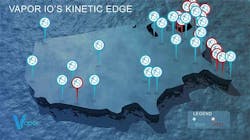Vapor IO: We’re Funded to Deploy 36 Edge Sites in Next 2 Years
In a significant move to fund deployment of edge computing infrastructure, Vapor IO has completed a Series C funding of $90 million from existing investors Berkshire Partners and Crown Castle.
The company said the funding will accelerate the build-out of its micro-modular edge data centers to an additional 16 cities in 2020, and more 16 sites in 2021. Vapor IO currently has deployed its Kinetic Edge platform in four markets – Chicago, Atlanta, Pittsburgh, and Dallas.
“The Third Act of the Internet requires that we build out edge computing infrastructure as quickly as possible,” said Cole Crawford, founder and CEO of Vapor IO. “With a total of 36 multi-site markets coming online over the next 24 months, we expect to be the largest provider of edge colocation, edge networking and edge exchange services in close proximity to the last mile networks.”
Vapor IO also said that Cloudflare, a publicly-held content delivery and security platform, will be deploying its cloud services on the Kinetic Edge platform, nationwide.
The Edge Shifts Into Construction Mode
Vapor IO’s funding and customer announcement, coming on the heels of Packet’s acquisition by Equinix last week, signals that the edge computing sector is quickly shifting into building mode.
“It’s a validation that edge is really here,” said Matt Trifiro, Chief Marketing Officer at Vapor IO. “Up until this year, edge computing has been a lot of plans and desires and anticipation. Now the deployments are about to scale.
“It’s not a white paper, it’s physical infrastructure,” said Trifiro. “We’re watching the Internet be transformed in front of our eyes.”
As we’ve previously noted, edge computing is not a single technology, but a phrase that describes several layers of infrastructure, some of which are refinements of existing models. Edge infrastructure is a response to new technologies – such as 5G wireless, distributed AI applications, data gravity and eventually autonomous cars – that require low latency and close proximity to users. These technologies are shaping the future of Internet infrastructure.
In our 2020 forecast, Data Center Frontier predicted the edge computing sector would get down to business, with a sharpened focus on commercial deployments and revenue.
Cloudflare Taps Vapor IO for Serverless Deployments
Vapor IO is creating a distributed network of edge colocation sites, housed in micro modular data centers that can be deployed at key points on the network, including telecom towers and antenna sites. The Kinetic Edge is Vapor IO’s network design, which uses both wired and wireless connections to create a reliable, low-latency network of colocation sites.
An operational Vapor IO Kinetic Edge modular edge data center site deployed outside Atlanta’s Mercedes-Benz Stadium. (Photo: Vapor IO)
The company has deployed data centers in Chicago, Atlanta, Pittsburgh, and Dallas, the company has another 16 markets in pre-construction, most of which it expects to build out in 2020. The company plans to deliver its Kinetic Edge platform to the top 36 U.S. metropolitan markets by the end of 2021.
“By deploying Vapor IO’s Kinetic Edge exchange, colocation, and networking services in the top U.S. markets, we provide a platform to deliver low-latency edge capabilities at the intersection of the wireline and wireless networks,” said Crawford.
The business case for edge deployments is illustrated by Cloudflare, which will use Vapor IO’s infrastructure to extend its growing global network of distributed infrastructure. In addition to content delivery and security services, developers will be able to deploy Cloudflare Workers to run serverless applications in Kinetic Edge cities, in close proximity to the devices they serve.
“Vapor IO has an aggressive rollout plan that spans the entire U.S.,” said Nitin Rao, Head of Global Infrastructure at Cloudflare. “Our mission is to help build a better Internet and our customers demand from us the most performant platform with a consistent experience across geographies. By partnering with Vapor IO, we’re able to deliver the benefits of our edge computing platform, Cloudflare Workers, to a wide array of new locations.”
Plans for 16 New Sites in 2020, 16 more in 2021
Vapor IO develops both software and hardware. Vapor IO’s modular data center packs 150kW of compute into an enclosure, mounting its round Vapor Chamber rack enclosure on a motorized turntable. Vapor IO’s Kinetic Edge uses software and high-speed connectivity to bring multiple micro data center facilities into a single virtual facility with multiple availability zones.
Modules are meshed together with high-speed fiber across a group of data centers. The design builds upon the “availability zone” approach popularized by Amazon Web Services, creating a cluster of local data centers to easily hand off data and traffic.
Vapor has begun pre-construction activities in 16 additional markets, doing the site work to prepare concrete pads and provision fiber and power. Once pre-construction is complete, the pre-fabricated micro-modular data center housing the Vapor Chambers will be placed on a truck, delivered to the site, and lifted by crane onto the waiting pad.
The 16 new markets in 2020 for the Kinetic Edge platform are (in alphabetical order): Austin, Boston, Charlotte, Columbus, Denver, Houston, Indianapolis, Las Vegas, Los Angeles, Miami, Nashville, Phoenix, San Antonio, San Francisco, Seattle and Washington D.C.
Vapor IO has plans to deploy its coast-to-coast Kinetic Edge platform in an additional 16 markets by the end of 2021. The Series C round was announced and partially funded in 2018, but included additional tranches based upon reaching milestones, which have now been achieved.
“Vapor IO has the key ingredients to deliver critical edge computing infrastructure to the top U.S. metropolitan markets,” said Josh Johnson, principal at Berkshire Partners. “We believe they have the technology, expertise, and access to the required land and fiber to build a nationwide footprint. We’re excited to partner with Vapor IO as they deploy fully-integrated edge solutions that improve performance, reduce costs and enable new applications for their customers.”
About the Author



